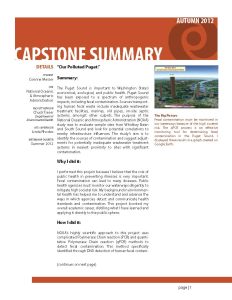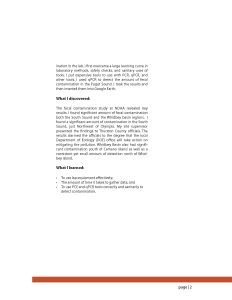Our Polluted Puget
The Puget Sound is important to Washington State’s economical, ecological, and public health. Puget Sound has been exposed to a spectrum of anthropogenic impacts, including fecal contamination. Sources transporting human fecal waste include inadequate wastewater treatment facilities, marinas, old pipes, on-site septic systems, amongst other culprits. The purpose of the National Oceanic and Atmospheric Administration (NOAA) study was to evaluate sample sites from Whidbey Basin and South Sound and look for potential correlations to nearby infrastructure influences. The study’s aim is to identify the sources of contamination and suggest adjustments for potentially inadequate wastewater treatment systems in nearest proximity to sites with significant contamination.

